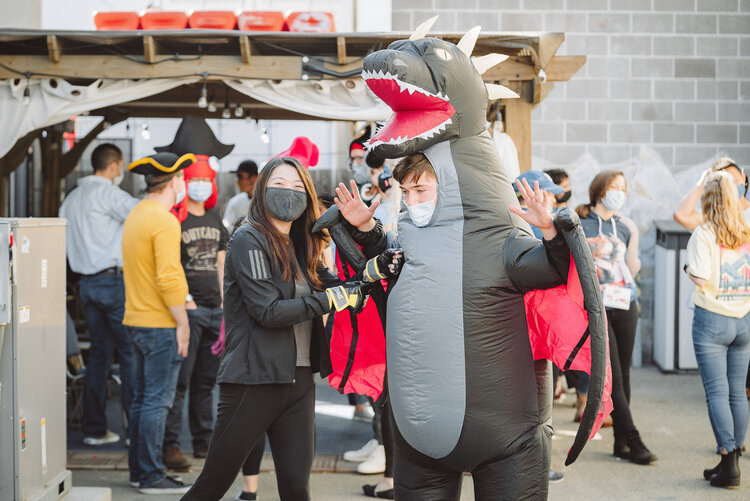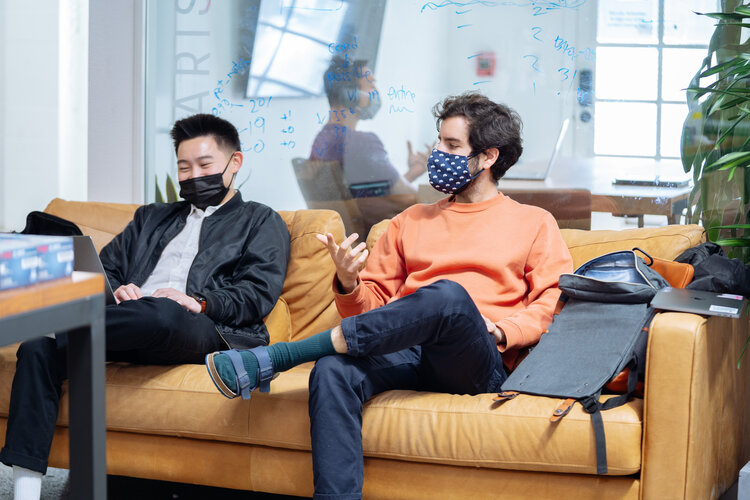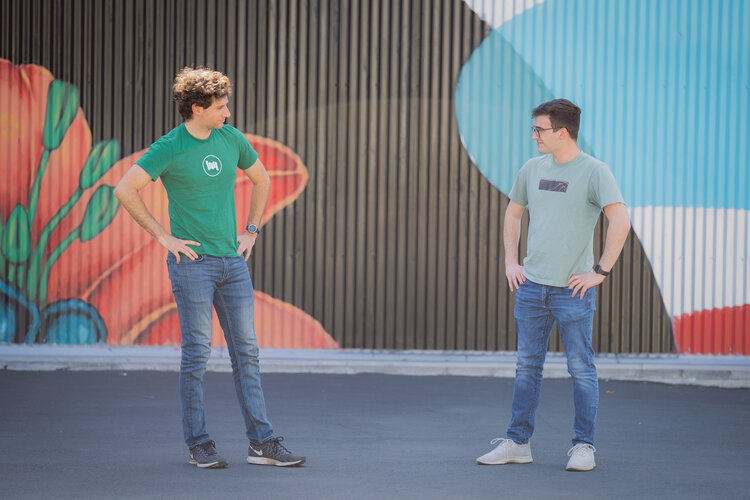
SBA: Presenting the Class of 2021
SBA: Presenting the Class of 2021
Our second class of SynBio Apprentices (SBAs) have officially completed their training. They've pipetted, coded, analyzed data, and became core Octonauts, all while covid-19 disrupted any sense of normalcy around us.
Despite the challenges of the year, the SBAs have contributed to Octant in large ways. Whether screening molecules for drug discovery, scaling our platform, contributing to significant software infrastructure, and planning company parties, the Class of 2021 have exemplified the meaning of being an SBA - work hard, learn a lot, and have fun while you're doing it.
Congrats to our Class of 2021! We're sad to see some of you go, but thrilled to see what you will accomplish.
What was your favorite part of the SBA program?
Nico: Throughout this past year, I really enjoyed spending time with other SBAs. We would often grab lunch together, spend late nights in the lab working together, and learn together through journal clubs and fireside chats. Octant recruited an amazing group of new-grads and becoming friends with them made the year so much more enjoyable!
Will: I will never forget my first 1:1 meeting with my scientist mentor. We grabbed drinks from the kitchen, stepped out of the office, and went for a walk. To be honest, I was nervous. We came from very different backgrounds—both scientifically and culturally—and, up until then, I had scarcely spoken with them. Yet, within just a few minutes, we were giddily quoting our favorite Kanye West lyrics and bonding over our shared life philosophies. Before I knew it, we had walked halfway across Emeryville. The SBA program promised an emphasis on mentorship, and in this area, it certainly did not disappoint.
Winnie: My team had an off-site where we all went to our mentor's apartment, played with her dog, ordered dosas, then walked to Curbside Creamery! It was mainly a meeting to hash out our quarterly goals, but I loved how we mixed in team bonding. Events like these really reflect Octant's fun culture.
Giselle: My favorite thing about the SBA program was working with so many people from different backgrounds. It was amazing to be a part of a team where everyone had their own contributions to Octant's overall goal. Everyone has their own scientific methods and are always up to discuss just about anything. The people at Octant made the SBA program more enjoyable than I could have imagined!

What was your favorite part of the SBA program?
Jerry: I think the hardest part was trying to troubleshoot that "last mile" with scaling up a novel technology like Octant's drug-screening platform. Science is tough and some experiments might not go as expected. However, in my role as an SBA on the Platform Development team, I learned the importance of astute observation, standardization, and collaboration - all qualities vitally important to constantly improve our technology.
Will: My previous research experiences had fairly consistent goals and priorities over a longer period of time. But at an early stage startup like Octant, the goals can shift in days. My team experienced this firsthand when we had to narrow our focus and double down on a smaller set of goals earlier this year. This meant putting my main project on hiatus, despite it nearing completion and having really tantalizing progress. It was hard pausing a project with 3 months invested in it, but I learned to find a balance between passion and personal pride.
Winnie: I knew working at a startup would be fast-paced, but Octant still surprised me! From shifting projects to troubleshooting experiments on a tight deadline, it can be hard to constantly context-switch. Running back and forth between labs to conduct experiments for different projects was hectic. It really taught me how to manage my priorities and stay organized, all while learning a ton. As Will said, it's all about finding balance and pace.
How did you grow scientifically during the SBA program?
Giselle: The SBA program allowed me to work with amazing people that helped me become more confident in my skills as a scientist. I was fortunate enough to work on different projects that allowed me to become more comfortable with the scientific process. I learned about the importance of planning, performing, and analyzing experiments to communicate results effectively across various teams at Octant. The most amazing thing to me was that despite the pandemic, everybody made it a part of their job to help all of the SBAs grow scientifically and personally whether that be in social distance mode or in remote mode.
Jerry: One of my professional goals as an SBA was to become "full-stack" - design experiments, carry them out, and analyze the data. By conducting experiments using Octant's platform, I feel empowered to tackle the scientific challenges I will inevitably face when I start graduate school.
Winnie: I had done synthetic biology research through iGEM during my undergrad, but Octant was on a completely new scale. I think the SBA program does a great job at building recent college graduates into capable scientists who can design and lead experiments from beginning to end. During my undergrad, I was mostly focused on conducting experiments with little computational data analysis. I wanted to learn how to design, troubleshoot, and dig through my own data to find those fascinating results. At Octant, my mentors really helped me develop those skills.
Will: I think I can run a long and complex luciferase assay, something I had never done before, in my sleep now. As my weightlifting/scientific manager Henry would say, I "got a lot of reps in" with some of the more routine wetlab tasks like transfections, freezing/thawing cell lines, and cloning. I still have a lot of room for growth, but honing my skills with a few techniques made me feel more confident in the lab.
Nico: During the SBA program, I've become much more comfortable with just how repetitive science can get. When experiments work sometimes but not others, it can be so frustrating. However, when you're trying to perfect a process, especially a biological one, it takes weeks and weeks of failed experiments and iteration. I've learned how to properly iterate on a process and also how to better predict experimental failure modes. These skills, along with a general comfort surrounding failure and repetition, will be valuable in my future research career.
Andrew: Since Octant’s work is very different from what I worked on during undergrad, I’m especially grateful to the SBA program for helping me navigate a new field. Beyond learning a ton of new skills and techniques, I feel more capable as a scientist overall coming out of the program. With the support of my mentors and peers in the program, I’ve gotten better at experimental design, troubleshooting, and thinking about scientific problems in a more nuanced way.

How did you grow professionally?
Giselle: Octant allowed me to get comfortable communicating with scientists. In the past, I was intimidated to interact with other scientists to ask for advice but I was fortunate enough to meet so many amazing people that are willing to help with career outlook and preparation.
Andrew: I’ve grown a ton professionally at Octant thanks to the amazing scientists here and the connections the SBA program fosters through the "Fireside Chats". Through the program, we’ve talked to scientists, PIs, VCs, and a variety of other amazing figures in science. It’s been fascinating to hear everyone’s unique stories and how they all come together in science, and I’m glad to have these different perspectives as I determine the next steps in my scientific career.
What's next for you? What are you most excited about for your "next step", whether it's staying as an RA at Octant or going elsewhere?
Andrew: I’m off to the Weill Cornell/Rockefeller/Sloan Kettering Tri-Institutional MD-PhD Program. I’m sad to leave Octant but I’m excited to incorporate the lessons I’ve learned at Octant into my future careers in science and medicine.
Winnie: I'm applying to medical school soon, where I plan to continue to do research!
Will: I'll be staying as an RA for one more year. When it came time to apply to PhD programs last fall, I decided I had too many awesome projects on the horizon for me to leave just yet. I'll be applying to PhD programs this cycle.
Jerry: I am going back to school in the fall where I will be pursuing my MD-PhD at the University of California, San Francisco (UCSF)! I am excited about meeting new classmates, helping patients, and continuing to do cool science.
Giselle: I'm looking forward to another year at Octant as an RA. I've been working with my scientist mentor to apply to graduate schools, which I'll start applying to this Fall.
Nico: I will be leaving Octant to join Northwestern’s MD-PhD program. There, I plan to continue conducting research at the intersection of genomics, technology, and medicine.

What's one important thing you learned this year?
Nico: In undergrad, I kept myself busy all the time — I was either studying for my classes, working on extracurriculars, or spending time with friends. This year, however, I started my transition into the "real world". I've learned how to live alone, pick up hobbies, and build relationships outside of an academic environment. While the pandemic made this transition much more difficult, I am fortunate to have been surrounded by fellow SBAs who were going through the same thing.
Andrew: This year, I’ve really learned what team-based science means. Octant is tackling problems that are too big for any one person to solve, and working within and across the different teams here has been an eye-opening experience for me. I’ve learned to better communicate scientifically while also thinking about the bigger picture beyond my own project’s minutiae. Finally, it’s been a ton of fun to work alongside and get to know my fellow SBAs/scientists, both in and out of the lab!
Jerry: One important, yet unexpected, skillset I learned was meticulous experimental planning during pandemic-induced global supply chain issues. Working at a company, experiments are on a much larger scale than in an academic lab. This means that a single experiment uses a lot of consumables, and any supply chain shortage can completely halt progress. By working with Gabby, our lab manager, we are able to avoid costly experimental downtime by planning advanced shipments and developing contingency plans for critical items. This experience taught me that managing supply logistics is just as essential as the design and execution of experiments in the successful practice of science.

Whats your biggest piece of advice for the next class of SBAs?
Nico: Push back and start asking questions as early as possible. You are a valued voice on the team and your thoughts on an experiment or project, even if they're relatively naive, can shift the team's experimental direction. While there are extremely talented scientists at Octant who are working on very complex problems, you bring an outside perspective that is just as valuable.
Jerry: Align your scientific interests with the work you do as an SBA. I think I was able to make a lot out of my experiences because my mentor and I worked closely together to figure out how to direct my interests in becoming an experimentalist towards major goals at Octant.
Winnie: It is intimidating to be the only SBA on a team of scientists brainstorming new projects, troubleshooting experiments, or trying to make sense of unexpected results. As others said, don't be afraid to push back. Voice your ideas and questions as soon as possible because everyone here is friendly and willing to help! Aside from that, bond with your SBA cohort and take advantage of Octant's fun company-wide events. Science can be really frustrating and the camaraderie goes a long way.
Will: Really lean into every opportunity that the SBA program gives you. Ask questions during All-Hands meetings. Do your homework for the training project. Take advantage of the breakfasts and seminars with Sri and Ramsey. Honestly, I entered the program just hoping to improve my molecular biology techniques, but I also learned a great deal about cell biology, bioinformatics, software engineering, and startups / entrepreneurship in general. Octant has experts across many disciplines, and if you only focus on pipetting liquids, you're missing out.
Andrew: Don’t be afraid to put yourself out there. This includes everything from asking questions in meetings to just getting to know your fellow Octonauts. Everyone here is brilliant but also very cool and down to earth, so take full advantage of this and engage with them as much as possible. You’ll grow and have the most fun by doing so!
Giselle: Invest in learning about the big picture at Octant and really familiarize yourself with the scientific goals of your team. Don't be afraid to ask your mentor about any questions regarding both the science and the process. Really try to learn about what you're doing by reading journal articles related to your projects to help make the science interesting for you.
Thank you to Andrew, Giselle, Jerry, Nico, Will, & Winnie for a great year. We're really excited for those staying to show next years class the ropes. Good luck as your scientific journey continues!
.jpeg)

Andrew

Giselle

Jerry

Nico

Will Owens

